
Body Parts on Planet Slum: Women and Telenovelas in Brazil PDF
Preview Body Parts on Planet Slum: Women and Telenovelas in Brazil
Body Parts on Planet Slum Body Parts on Planet Slum Women and Telenovelas in Brazil Lisa Beljuli Brown Anthem Press An imprint of Wimbledon Publishing Company www.anthempress.com This edition first published in UK and USA 2011 by ANTHEM PRESS 75-76 Blackfriars Road, London SE1 8HA, UK or PO Box 9779, London SW19 7ZG, UK and 244 Madison Ave. #116, New York, NY 10016, USA Copyright © Lisa Beljuli Brown 2011 The author asserts the moral right to be identified as the author of this work. Cover image ‘Nilzete watching the telenovela, A Indomada, Santa Cruz, January 2000’ © 2011 Lisa Beljuli Brown All rights reserved. Without limiting the rights under copyright reserved above, no part of this publication may be reproduced, stored or introduced into a retrieval system, or transmitted, in any form or by any means (electronic, mechanical, photocopying, recording or otherwise), without the prior written permission of both the copyright owner and the above publisher of this book. British Library Cataloguing-in-Publication Data A catalogue record for this book is available from the British Library. Library of Congress Cataloging-in-Publication Data Brown, Lisa Beljuli. Body parts on planet slum : women and telenovelas in Brazil / Lisa Beljuli Brown. p. cm. Includes bibliographical references. ISBN-13: 978-0-85728-797-7 (hardback : alk. paper) ISBN-10: 0-85728-797-4 1. Poor women–Brazil–Social conditions. 2. Slums–Brazil. 3. Television soap operas–Brazil. I. Title. HQ1542.B76 2011 306.4–dc23 2011033939 ISBN-13: 978 0 85728 797 7 (Hbk) ISBN-10: 0 85728 797 4 (Hbk) This title is also available as an eBook. For Mary Hurley TABLE OF CONTENTS Foreword ix Introduction xvii Chapter 1 Theodicy and Ideology: ‘Everybody Needs an Ideology to Live’ 1 Chapter 2 The Meek Shall Inherit the Earth; But in the Meantime They Shall Watch Telenovelas 21 Chapter 3 Suffering Soaps; Fragmented Bodies 59 Chapter 4 The Politics of the Vagina 67 Chapter 5 The Redemptive Womb 81 Chapter 6 The Invisible Back 99 Final Feliz 121 Illustrations 125 Table: Women Respondents 133 Glossary 137 Bibliography 139 Index 149 FOREWORD Janie grows up with her ex-slave grandmother in the yard-room of a kindly, wealthy white family in rural western Florida. She plays all the time with the four white children. One day a roving photographer takes a picture of the five children: “So when we looked at de picture and everybody got pointed out there wasn’t nobody left except a real dark little girl with long hair standing by Eleanor. Dat’s where Ah wuz s’posed to be, but Ah couldn’t recognize dat dark chile as me. So Ah ask, ‘where is me? Ah don’t see me’. “Everybody laughed… ‘Dat’s you…don’t you know yo’ownself?’… Ah looked at de picture a long time and seen it was mah dress and mah hair so Ah said: “‘Aw aw! Ah’m coloured!’ “Den dey all laughed real hard. But before Am seen de picture Ah thought Ah wuz just like de rest. (Zora Neale Hurston 1937) Rereading Body Parts on Planet Slum brought to mind this icon of Janie in Hurston’s novel of more than fifty years earlier.1 The impoverished women of the bairros of Salvador with whom Beljuli Brown lived and worked are also the descendants of African slaves. I want to ask: how similarly and how differently from Janie do these women find themselves, mirrored in the white, middle- class heroines of the soap operas that play day in, day out on broken-down televisions in overcrowded shacks? As the book’s title indicates, slums are our future. Indeed, our future is already behind us; the ‘slumification’ of the planet is outstripping all predictions. What this book portrays and the theses it argues are thus urgent, general rather than particular. Lisa Beljuli Brown refers to the so-called ‘mirror-stage’ in the theory of the French psychoanalyst Jacques Lacan; here I want to reopen the discussion through 1 I would like to thank my daughter, Polly Rossdale, for explaining to me the main similarities and differences between Brazilian and North American slavery and for finding this half-remembered quotation from Their Eyes Were Watching God (1937).
